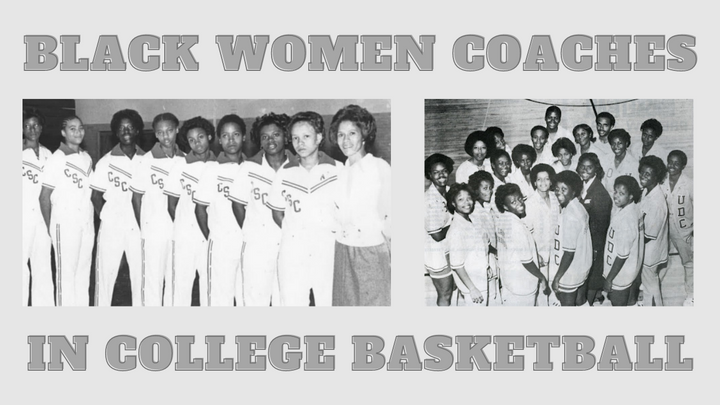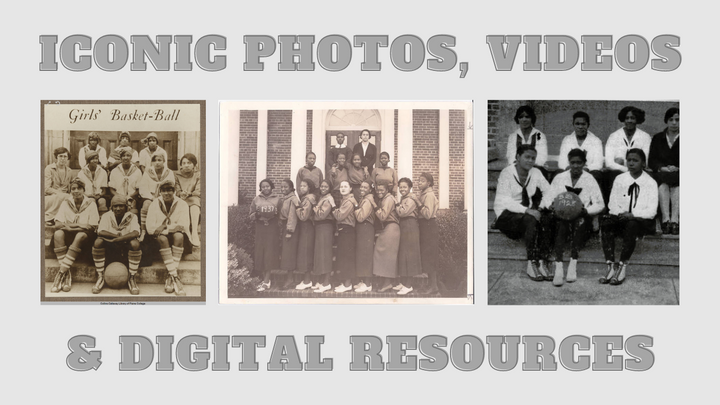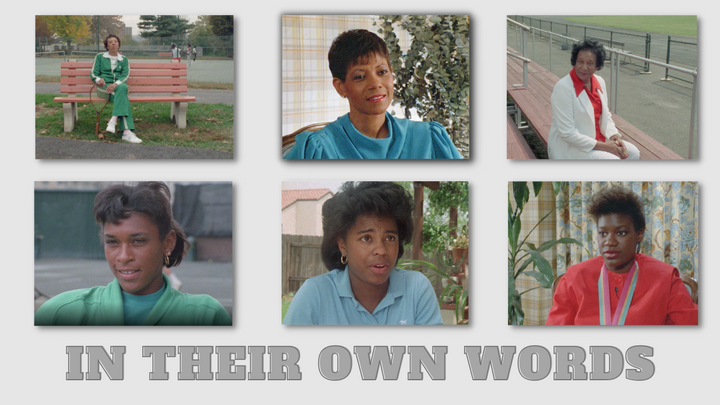Celebrating those who amplify Black sportswomen
Today we’re honoring the people, publications and organizations around the world who I see working to amplify the stories of Black sportswomen.
Today we’re honoring the people, publications and organizations around the world who I see working, specifically and intentionally, to amplify the stories of Black sportswomen or those who focus on doing work to keep Black women and girls in sports.
This is by no means an exhaustive list, but it’s just the people who I see. For example, I already know I want to follow more people in the Caribbean, Latin America, South America (Brazil is a high priority). I want to diversify the sports I follow, too.
That’s why I want you to share any person, organization or publication I should follow in the comments or on social media using #blacksportswoman so we can amplify them and their work (and selfishly, so I can follow them too. Let’s be real).
Organizations
Black Women in Sports Foundation is a Philadelphia-based organization created to “challenge the assumptions about black women’s participation in non-traditional sports.”
Why you should follow: Their mission is “to increase the involvement of black women and girls in all aspects of sport, including athletics, coaching and administration.” This organization was started by four Black women who met at Temple, Tina Sloan Green (lacrosse), Dr. Alpha Alexander (basketball), Dr. Nikki Franke (fencing), and Linda Greene, Esq.
Black Girl Hockey Club aims to make “hockey more inclusive for Black women, our family, friends and allies.”
Why you should follow: This organization was started by Renee Hess to bring together Black women who love hockey. BGHC is a great example of a group organizing and creating real change through sports, education and community events. BGHC has a scholarship program to “subsidize the costs of playing hockey for Black girls.”
Black Women’s Players Collective is the voice of the Black players in the National Women's Soccer League.
Why you should follow: The Black women in the NWSL organized themselves, began to advocate for themselves and speak for themselves when they felt they weren’t being represented. They’ve released statements through coordinated efforts, aim to work in their local communities and launched social media page, but are still working behind the scenes to develop the initiative.
Publications
Ladies’ March, created by Janine Tony, is a publication about women’s football in Africa.
Why you should follow: Janine Tony writes/presents for BBC and I learn a lot about what’s going on in the various leagues (and about the leagues themselves) by following Tony, Ladies March and the publication below. Also, do you know how hard it is to find match streams? Tony shares them when she can.
JWSports1 is a women’s football publication that is “navigating the women's end of the beautiful game in Africa.”
Why you should follow: Their post last week about about the Tanzanian Women’s League 2020-21 kickoff, where they shared six in-depth talking points is an example of content I don’t think I’d be able to find anywhere else. They also share match times, updates and results, on their site and on Twitter, when that information is usually hard to find for me.
Around the Rim by LaChina Robinson & Terrika Foster-Brasby is an ESPN podcast about women’s college basketball and the WNBA.
Why you should follow: The Around the Rim podcast has been one of my favorite podcasts for years. I think the duo create great work together and also bring in great minds. It’s just fun every episode. LaChina Robinson is an expert analyst of the game of basketball and she knows the women’s game so well you get smarter with each episode. Foster-Brasby is a producer/co-host but has written about the WNBA in places like the New York Times.
Follow LaChina and Tereka because they do great work in a lot of places.
Girls Talk Sports TV was created by Khristina Williams.
Why you should follow: Williams has interviews with players I don’t hear from often (but I hear about) like DeWanna Bonner, talked to Syd Colson about recovering from COVID-19 and interviewed L.A. Sparks President and COO Danita Johnson.
Made for the W is for the “Made for the Modern Sneakerhead.”
Why you should follow: If you love sneakers, culture, basketball, or just want to see what shoes your favorite athletes are rocking, this is a great follow. Their website says they are a “lifestyle platform creating inclusion for women’s sports + sneaker culture on and off the court.”
People
Amira Rose Davis is a professor specializing in race, gender, sports and politics and co-host of the Burn It All Down podcast
Why you should follow: I’ve admired Amira Rose Davis’ work and focus on Black women athletes in sports for a while. Davis has written pieces on national platforms, I’ve heard her on NPR. Quick fun story: I was listening to one of my favorite podcasts, Throughline, and the topic was athlete activism. As I listened, I thought, “wow, where all the women?” Shortly after, Amira Rose Davis’ voice popped up. Davis is writing a book called, “Can’t Eat a Medal”: The Lives and Labors of Black Women Athletes in the Age of Jim Crow. I can’t wait to pre-order it.
Erica L. Ayala is a “NYC-based podcaster & sportswriter.”
Why you should follow: Erica L. Ayala creates real and honest conversations about social justice and women’s sports, but is also a go-to if you want to learn more or follow women’s hockey or women’s basketball (especially New York). Ayala does a lot to “reimagine how women’s sports is covered,” has a women’s hockey podcast and brings people together on a YouTube series, which aims to “disrupt systemic oppression by facilitating critical conversations in the sports space.”
Jasmine Baker is a “women’s sports culturalist” and creator of WeGotGame2.
Why you should follow: Jasmine Baker is cool, a curator and creator of things that are just as dope. If you love sports and culture, this is your follow. Did you see the Origin Collection collaboration with New Jersey Sets? It sold out. Baker brought out a collab that honored original WNBA teams with shorts and merch that only someone with knowledge of both culture and sports could tap into. Truly I haven’t seen anything like it before with the WNBA. A breath of fresh air.
Pepper Persley is a 9-year-old journalist who has the Dish With Pepper and She Got Next podcasts.
Why you should follow: Pepper is so consistent (seriously, more consistent than me) and is the future and the now of women’s basketball coverage. Pepper asks the best questions and not only asks top college basketball players what she wants to know but showed up and asked top WNBA stars questions about race, systemic racism and activism during this summer’s WNBA season. If you only follow one person on this list, let it be Pepper! I’m such a huge fan.
Chloe Pavlech is a social content creator, basketball analyst and on-air star.
Why you should follow: Chloe Pavlech will keep you entertained on social media – I’m not kidding when I say Pavlech is so good at this – but is the only professional women’s sports content creator who focuses on Gen Z. Yes, that is a TikTok link. I don’t even have the app and I watched like four posts before I closed the tab.
Arielle “Ari” Chambers is a host, social media manager, etc. at Bleacher Report.
Why you should follow: Ari Chambers’ content at HighlightHER, or anywhere, is all about letting WNBA, women’s college basketball players, or any woman athlete speak for themselves. It also feels like Chambers has mastered the art of creating relationships, spaces and questions that help players feel comfortable being themselves during interviews, which is difficult in the traditional journalism space.
Charles Hallman is a longtime print journalist and sports reporter.
Why you should follow: Charles Hallman works at a Black owned publication and does the work, has remained consistent for years and his Twitter account says “I am a longtime Black journalist who works hard at what I do” and there is no lie there. A link to his author page.
Samuel Ahmadu is Goal Africa’s women’s football correspondant.
Why you should follow: I stay up to date on what is happening with African footballers (when they score, when they sign, etc.) at home and around the world because he posts about them frequently and consistently. Ahmadu’s latest post is a feature about the Nigerian Women’s Premier League.
Syanie Dalmat is a French sports journalist.
Why you should follow: Dalmat covers the French women’s football league and French national team, which is a diverse league and team (at least more than I’m used to here in America). Dalmat’s work and tweets are in French, but you should have the option to translate if you’re on Google Chrome.
Fadumo Olow is the social media editor at The Telegraph Women’s Sport.
Why you should follow: Olow also writes as well for the women’s sports section and covers a range of sports (there’s even netball!) and has written about diversity in running and the Women’s Super League (English women’s football league) and life for Muslim sportswomen, etc. A good follow. I even had to subscribe to the Telegraph so I’d stop missing stuff Olow wrote.
Jess Creighton is a TV presenter in England.
Why you should follow: Because it’s Jess Creighton. Creighton’s work doesn’t focus solely on women’s sport, but she does often enough that the Lionesses called her up to do an interview with Nikita Parris and Kerry Davis. Creighton also has a YouTube series called B is for: Black, where she brought on lots of Black women, including many Black sportswomen, in England to discuss a range of topics.
Nia Symone is a women’s basketball content creator.
Why you should follow: She’s an emerging star who is good at analyzing the game and creating. This is one to keep your eye on. Nia Symone creates at Overtime, has a podcast, and creates spot analysis on video for social media.
Dorothy Gentry is a sports reporter who, among other things, covers the WNBA and women’s college basketball.
Why you should follow: Gentry has written for the New York Times about Natasha Cloud, for FiveThirtyEight about WNBA MVP A’ja Wilson and for The Next about the six Black women head coaches in the Southeastern Conference.



Comments ()